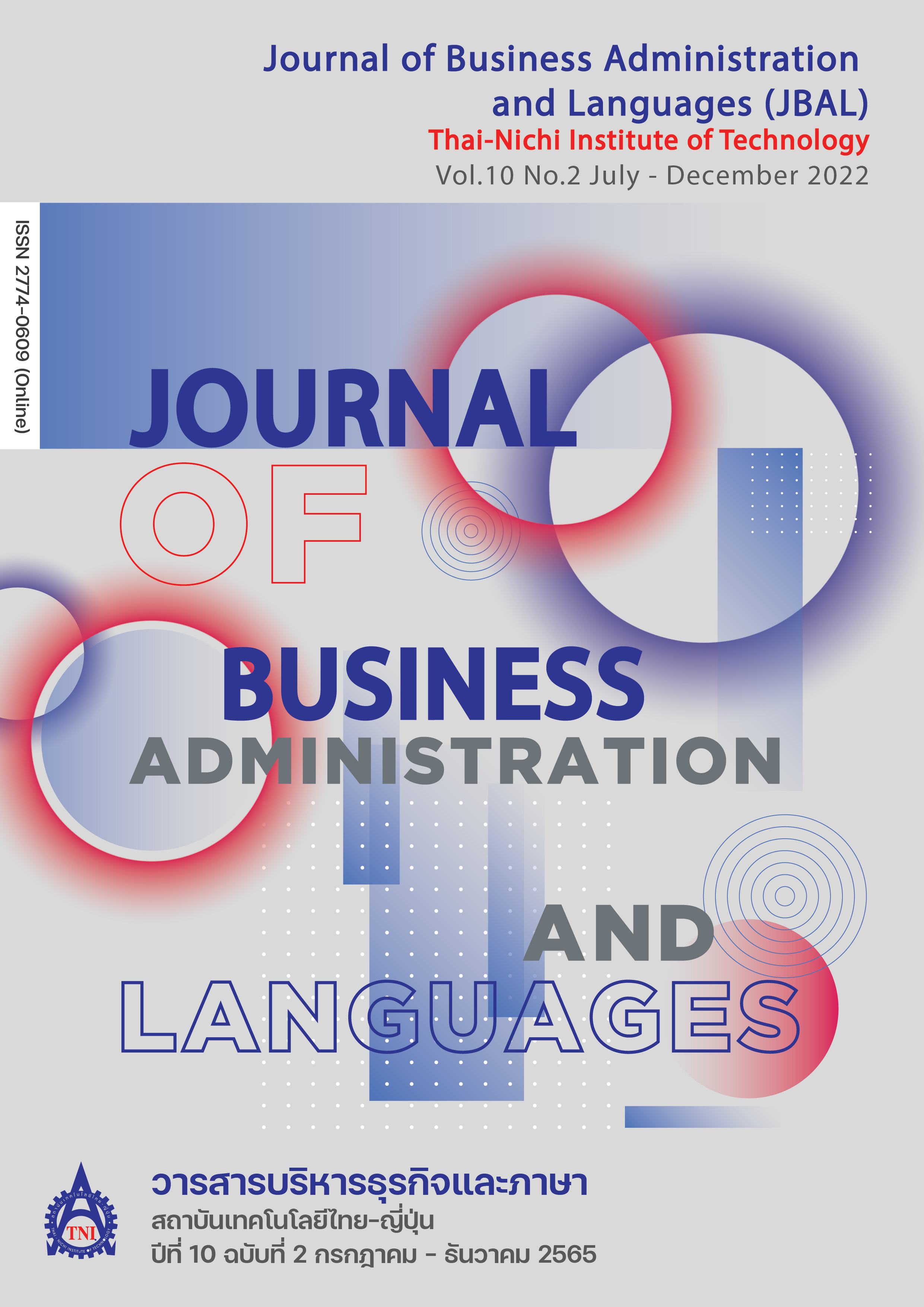The Influence of Perceived Usefulness, Ease of Use, Security, Trust, and Satisfaction Affect the Intent of Continuing to Use G-Wallet among Generation X Y Z
Main Article Content
Abstract
The purpose of this research was to investigate factors, perceived usefulness, ease of use, security, trust, and satisfaction influencing a continuance to use G-Wallet among generation x y z, to analyze direct and indirect effects of factors influencing a continuance to use G-Wallet. This research was conducted using questionnaires as an instrument to collect data 497 samples comprised of 164 Generation X, 164 Generation Y, and 169 Generation Z were collected online and onsite with stratified random sampling. This research was conducted using the principles of structural equation modeling (SEM) which required confirmatory factor analysis on the measurement model and path analysis on the structural model.
The research result showed that trusting technology acceptance direct influence the intention to use G-Wallet by .66. The analysis through indirect influences on satisfaction affects the intention to use G-Wallet, it was found that trusting technology acceptance affects the intention to use G-Wallet through satisfaction with total influence value of .75 at a significance level of 0.01. It can be said that satisfaction drives higher user’ intention to continue using G-Wallets. The constructed model of continuance to use G-Wallet showed good fit with the empirical data as follows Chi-square = 950.692 df =348, CMIN/df =2.73, Probability level (p-value) =0.000, GFI =.93 AGFI =.90, CFI =.95, NFI =.93, RMR=.05, RMSEA=.06
Article Details

This work is licensed under a Creative Commons Attribution-NonCommercial-NoDerivatives 4.0 International License.
Article Accepting Policy
The editorial board of Thai-Nichi Institute of Technology is pleased to receive articles from lecturers and experts in the fields of business administration, languages, engineering and technology written in Thai or English. The academic work submitted for publication must not be published in any other publication before and must not be under consideration of other journal submissions. Therefore, those interested in participating in the dissemination of work and knowledge can submit their article to the editorial board for further submission to the screening committee to consider publishing in the journal. The articles that can be published include solely research articles. Interested persons can prepare their articles by reviewing recommendations for article authors.
Copyright infringement is solely the responsibility of the author(s) of the article. Articles that have been published must be screened and reviewed for quality from qualified experts approved by the editorial board.
The text that appears within each article published in this research journal is a personal opinion of each author, nothing related to Thai-Nichi Institute of Technology, and other faculty members in the institution in any way. Responsibilities and accuracy for the content of each article are owned by each author. If there is any mistake, each author will be responsible for his/her own article(s).
The editorial board reserves the right not to bring any content, views or comments of articles in the Journal of Thai-Nichi Institute of Technology to publish before receiving permission from the authorized author(s) in writing. The published work is the copyright of the Journal of Thai-Nichi Institute of Technology.
References
Alshurideh, M. T., Al Kurdi, B., Masa’deh, R., & Salloum, S. A. (2021). The moderation effect of gender on accepting electronic payment technology: A study on United Arab Emirates consumers. Review of Information Business and Strategy, 31(3), 375–396.
Bagla, R. K., & Sancheti, V. (2018). Gaps in customer satisfaction with digital wallets: challenge for sustainability. Journal of Management Development, 37(6), 442–451.
Byrne, B. M. (2009). Structural Equation Modeling with AMOS: Basic Concepts, Applications, and Programming (2nd ed.). New York, NY: Taylor and Francis.
Chanchai Chaiprasit. (2021). “6 Megatrends” will change the global payment system in the next 5 years (in Thai). Retrieved from https://www.pwc.com/th/en/pwc-thailand-blogs/blog-20210727.html
CT Team. (2019). Generations trend 2020 (in Thai). Retrieved from https://creativetalklive.com/insight-generations-trend-2020/
Davis, F. D. (1989). Perceived usefulness, perceived ease of use, and user acceptance of information technology. MIS Quarterly, 13(3), 319–340.
Fillgoods Technology. (2021, December 26). Penetrating the behavior of consumers of 4 generations, allowing entrepreneurs to plan marketing plans to create sales beyond the target. (in Thai). Retrieved from https://fillgoods.co/online-biz/shop-orders-focus-on-behavior-4-generations-marketing-plan/
Fiscal Policy Office. (2021). The progress of the more you spend, the more you get project (in Thai). [Pamphlet]. Retrieved from https://www.mof.go.th/th/view/attachment/file/3135393430/
Hair, J. F., Jr., Black, W. C., Babin, B. J., & Anderson, R. E. (2010). Multivariate Data Analysis (7th ed.). Upper Saddle River, NJ: Prentice Hall.
Jiraphat Mikhanmak, Nisarath Sodamuk, Panisara Tantikulchat, & Nalinpat Bhumpenpein. (2021). Factors influencing acceptance to use of PAOTANG application. (in Thai). The 4th National Conference in Science and Technology : NCST4th, 103–108. Retrieved from http://sci.chandra.ac.th/ncst2021/jdownloads/99/2/1.P-10.pdf
Kline, R. B. (2011). Principles and Practice of Structural Equation Modeling (3rd ed.). New York, NY: Guilford Press.
Kumar, A., Adlakaha, A., & Mukherjee, K. (2018). The effect of perceived security and grievance redressal on continuance intention to use M-wallets in a developing country. International Journal of Bank Marketing, 36(7), 1170–1189.
Marshall, E. M. (2000). Building trust at the speed change: The power of the relationship-based corporation. New York, NY: American Management Association.
Oliver, R. L. (1997). Satisfaction: A behavioral perspective on the customer. New York, NY: McGraw Hill.
Oliver, R. L., & DeSarbo, W. S. (1988). Response determinants in satisfaction judgments. Journal of Consumer Research, 14(4), 495–507.
Siriluck Rotchanakitumnuai. (2019). Mobile banking acceptance for continuing usage of Thai commercial banks. (in Thai). Journal of Business Administration the Association of Private Education Institutions of Thailand, 8(2), 10–21, Retrieved from http://www.vu.ac.th/apheitvu/journal/v8n2/chapter1.pdf


